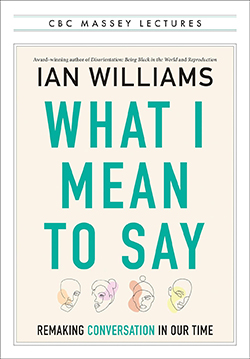
We are excited to present two inspiring and though-provoking keynote speakers at the conference!

A good conversation takes time and patience—courage, even. But conversations these days are marked by increased tension, incivility, and polarization. It’s natural to want to avoid charged subjects altogether by silencing ourselves. There’s an endless supply of books and articles on difficult conversations, many promising strategies. How do they hold up to testing? Are we fighting more than we’re talking? Drawing on material from his 2024 CBC Massey Lectures on conversation, Williams offers key considerations for difficult conversations. Conversations remain our best hope for building meaningful connections across differences.
| Biography |
|
Ian Williams is the author of seven books of fiction, nonfiction, and poetry. His book, Disorientation, considers the impact of racial encounters on ordinary people. His book Reproduction won the Scotiabank Giller Prize and was published in Canada, the US, the UK, and Italy. His poetry collection, Word Problems, converts the ethical and political issues of our time into math and grammar problems. It won the Raymond Souster Award. His previous collection, Personals, was shortlisted for the Griffin Poetry Prize and the Robert Kroetsch Poetry Book Award. His short story collection, Not Anyone’s Anything, won the Danuta Gleed Literary Award for the best first collection of short fiction in Canada. His first book, You Know Who You Are, was a finalist for the ReLit Poetry Prize. He is a trustee for the Griffin Poetry Prize. His newest book What I Mean to Say: Remaking Conversation in Our Time (The CBC Massey Lectures), seeks to ignite a conversation about conversation, to confront the deterioration of civic and civil discourse, and to reconsider the act of conversing as the sincere, open exchange of thoughts and feelings. Williams completed his Ph.D. at the University of Toronto. After several years teaching poetry in the School of Creative Writing at the University of British Columbia, Williams returned to the University of Toronto as a tenured professor of English. He was the 2014-2015 Canadian Writer-in-Residence for the University of Calgary’s Distinguished Writers Program. He has held fellowships or residencies from Vermont Studio Center, the Banff Center, Cave Canem, and the National Humanities Center. In 2022, he will be the Visiting Fellow at the American Library in Paris. |
What would it mean to engage computation and cognition from an Earth-centred perspective, where humans are neither at the centre nor the only intelligence in town? This talk reports on the educational and artistic experiment Burnout From Humans, designed to explore that question. The outcomes of the experiment are presented in the interim report Standing in the Fire: A Speculative Inquiry into Meta-Relationality and AI.
The preliminary findings suggest that the way we engage with AI could either deepen modernity’s separations or help us begin to sense and coordinate together at planetary scale. This talk will share what we learned from inviting AI into an Earth-centred inquiry, and what this might mean for education in times of collapse, complexity, and ecological urgency.
This talk explores how the ontology of modern education has socialized us into a form of narrow-boundary intelligence marked by the artificial separation between humans and the rest of nature. This narrow-boundary intelligence creates a crisis of collective sense making that is the root of our current meta-crisis characterized by VUCA (volatility, uncertainty, complexity and ambiguity), which is placing humanity at risk of premature extinction. The talk will also explore the need for a collective cultural move towards wide-boundary intelligence and, ultimately, relational wisdom, if we are to address the meta-crisis together.
| Biography |
| Sharon Stein is an Associate Professor and Professor of Climate Complexity and Coloniality in the Department of Educational Studies at the University of British Columbia. She has worked in the areas of global citizenship education, climate education, and higher education, and collaborates with scientists, artists, activists, and Indigenous communities to ask: What kind of education could prepare people to navigate social and ecological instability with a compass of emotional sobriety, intellectual discernment, and intergenerational responsibility? She is the author of Unsettling the University: Confronting the Colonial Foundations of US Higher Education, and a co-founder of the Gesturing Towards Decolonial Futures Arts/Research Collective. Currently, she is focused on an inquiry about how we might develop earth-aligned AI for education. |










 Subscribe to this Page
Subscribe to this Page